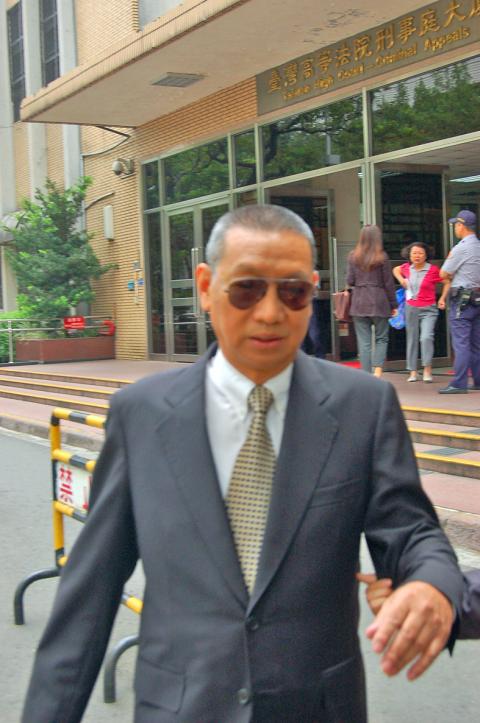The Taiwan High Court yesterday overturned the conviction of retired army lieutenant-general and deputy commander of the Military Police Command Chen Chu-fan (陳築藩) on charges of conducting espionage, leaking military secrets to China and recruiting subordinate military officers as spies, citing insufficient evidence.
Prosecutors are likely to appeal yesterday’s ruling.
In the first ruling on the case in 2013, Chen, then 67, was found guilty and given a 20-month prison term for contravention of the National Intelligence Services Act (國家情報工作法) and the National Security Act (國家安全法).

Photo: Yang Kuo-wen, Taipei Times
Chen, a high-ranking Chinese Nationalist Party (KMT) member with considerable influence and connections in military and political circles, was a former deputy director of the KMT’s Taipei City chapter and headed one chapter of the party’s Huang Fu-hsing (黃復興) military veterans’ organization, as well as directing the Ministry of National Defense’s liaison office for the legislature.
When the high court handed down the ruling yesterday morning, Chen rose from his seat to take a bow, and said “Thank you” to the presiding judge.
Chen was charged in 2013, along with retired army major Chen Shu-lung (陳蜀龍), who had long worked for the ministry’s Military Intelligence Bureau and had access to highly sensitive military documents, including the names of Taiwan’s secret service operatives working in foreign countries.
The Supreme Court in 2014 upheld the guilty verdict and five-year prison term for Chen Shu-lung, who was 74 at the time.
According to the 2014 court ruling, Chen Chu-fan began taking frequent trips to China upon his retirement in 2004, then went on to establish links with the Shanghai City State Security Bureau, its deputy director and other Chinese intelligence officials.
Prosecutors said surveillance and telephone wiretaps indicated Chen Chu-fan agreed to recruit Taiwanese military officers for a spy network and later introduced Chen Shu-lung to Chinese intelligence officials.
The two men were accused of selling documents pertaining to the defense ministry’s troop deployment and readjustment planning, the government’s election analysis reports, the KMT’s internal report on Taipei election campaigning by the Huang Fu-hsing branch, information on the ministry’s military exercise program and information on Falun Gong members and their activities in Taiwan.
Chen Shu-lung was suspected of leaking names of Taiwanese intelligence operatives working abroad, which led to one National Security Bureau officer serving as a diplomat in Japan having his cover blown and being interrogated by Chinese authorities for three days during a visit to Shanghai.

Taiwanese can file complaints with the Tourism Administration to report travel agencies if their activities caused termination of a person’s citizenship, Mainland Affairs Council Minister Chiu Chui-cheng (邱垂正) said yesterday, after a podcaster highlighted a case in which a person’s citizenship was canceled for receiving a single-use Chinese passport to enter Russia. The council is aware of incidents in which people who signed up through Chinese travel agencies for tours of Russia were told they could obtain Russian visas and fast-track border clearance, Chiu told reporters on the sidelines of an event in Taipei. However, the travel agencies actually applied

Japanese footwear brand Onitsuka Tiger today issued a public apology and said it has suspended an employee amid allegations that the staff member discriminated against a Vietnamese customer at its Taipei 101 store. Posting on the social media platform Threads yesterday, a user said that an employee at the store said that “those shoes are very expensive” when her friend, who is a migrant worker from Vietnam, asked for assistance. The employee then ignored her until she asked again, to which she replied: "We don't have a size 37." The post had amassed nearly 26,000 likes and 916 comments as of this

New measures aimed at making Taiwan more attractive to foreign professionals came into effect this month, the National Development Council said yesterday. Among the changes, international students at Taiwanese universities would be able to work in Taiwan without a work permit in the two years after they graduate, explainer materials provided by the council said. In addition, foreign nationals who graduated from one of the world’s top 200 universities within the past five years can also apply for a two-year open work permit. Previously, those graduates would have needed to apply for a work permit using point-based criteria or have a Taiwanese company

US President Donald Trump said "it’s up to" Chinese President Xi Jinping (習近平) what China does on Taiwan, but that he would be "very unhappy" with a change in the "status quo," the New York Times said in an interview published yesterday. Xi "considers it to be a part of China, and that’s up to him what he’s going to be doing," Trump told the newspaper on Wednesday. "But I’ve expressed to him that I would be very unhappy if he did that, and I don’t think he’ll do that," he added. "I hope he doesn’t do that." Trump made the comments in